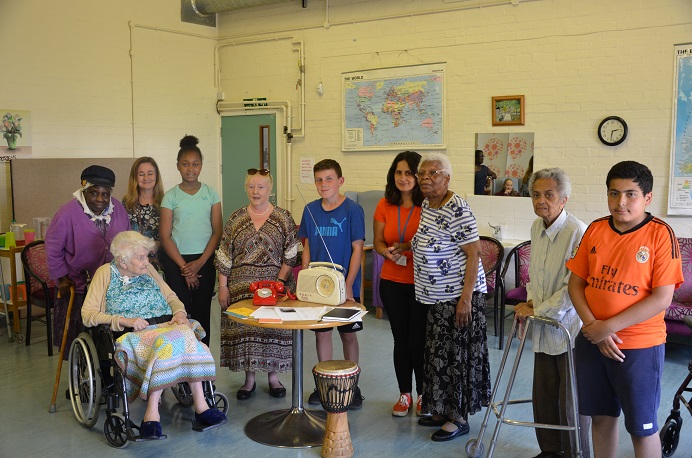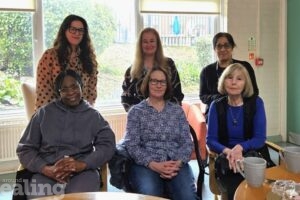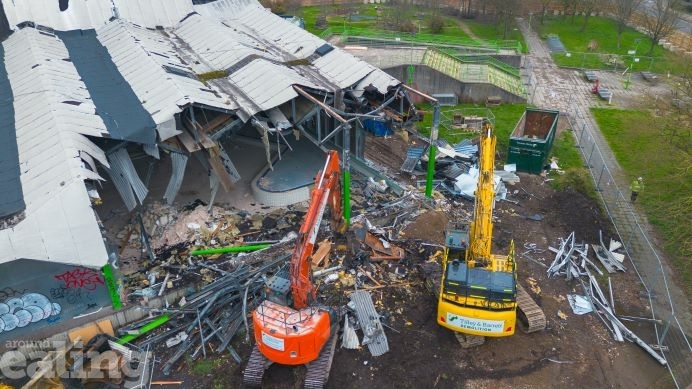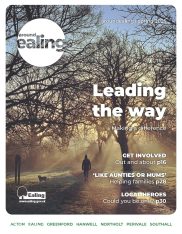Thanks to advances in medical science, people are living much longer than previous generations. Babies born now are expected to live 10 years longer than those born in the 1950s and 60s and we are increasingly seeing people reach their 100th birthday.
Although that should be a cause for celebration, it does mean more people are living with dementia than ever before. Dementia is not an inevitable consequence of old age, but the chances of suffering from the condition do increase as we get older.
There are currently thought to be around 850,000 living with the disease in the UK, with the number set to rise to more than a million by 2025.
Michael Flanders Resource Centre in Acton works with people over 65 with physical disabilities and dementia. It has started a ground-breaking scheme to help older people to keep their brains and social skills active.

Those attending the centre are paired with children from St Vincent’s Catholic Primary School in Acton to visit a reminiscence room, which is filled with memorabilia and objects from the past.
Often people with dementia can still remember things from their childhood, even when their short-term memory is failing. The innovative programme not only helps the dementia sufferer through stimulating their brain and memory, it gives children the chance to find out about recent history first-hand from older people.
Nearly 40% of people have a relative or close friend with dementia, so the inter-generational scheme is also a helpful way for children to start to learn about dementia and how to talk to someone suffering from the condition.
The centre also runs joint pottery sessions with the pupils and older people, which is a great way for sufferers to develop new skills and stay physically and mentally active.
‘These inter-generational projects are great because they work both ways’
Mah, who is a carer and daughter of one of the dementia patients, said: “For me as a carer it is peace of mind that my mum is being cared for in a positive and inclusive environment. It allows us to be able to do other tasks and things that we have to do as a part of our everyday life. It helps indirectly to help carers’ wellbeing.
“These inter-generational projects are great because they work both ways. They support people to kind of have projects that stimulate their memories and be around younger people. It helps younger people have that connection and, I guess, experience of talking to older people who are not their family members. One of the children said he would be more likely to help and talk to older people they don’t know as a result of undertaking this project, and I think that is encouraging.”
You can view a video at the top of this article, with Mah sharing her experiences.
‘A hugely beneficial project for all concerned’
Councillor Binda Rai, cabinet member for adults services said: “This is a hugely beneficial project for all concerned; it’s a win-win situation for those with dementia as they get to share activities and experiences with the younger generation, who in turn get to learn about the older generation and living with dementia.
She added: “In addition to the immediate inter-generational benefits, the school, care and health services, and the wider community also gain from the experience in the long- term. We know that dementia will continue to effect a growing number of people and any project that improves our understanding of it, is good for society as a whole. I am pleased that Ealing continues to work towards improving our understanding.”
‘Most of them seem excited to come to the centre’

Councillor Yvonne Johnson, cabinet member for schools and children’s services, said: “I am very proud of the fact that Ealing Council supports this project. This day centre is very important to our older residents and they really enjoyed working with the children from St Vincent’s Primary School. By attending the centre it means that some of the carers can have a break during the week, and the results are beneficial to the dementia patients because most of them seem so excited to come to the centre.”
More information
More information about the Michael Flanders centre is available on the council website.
Visit the Alzheimers website to find out more about the signs and symptoms of dementia and how to reduce the chance of suffering from the condition.







